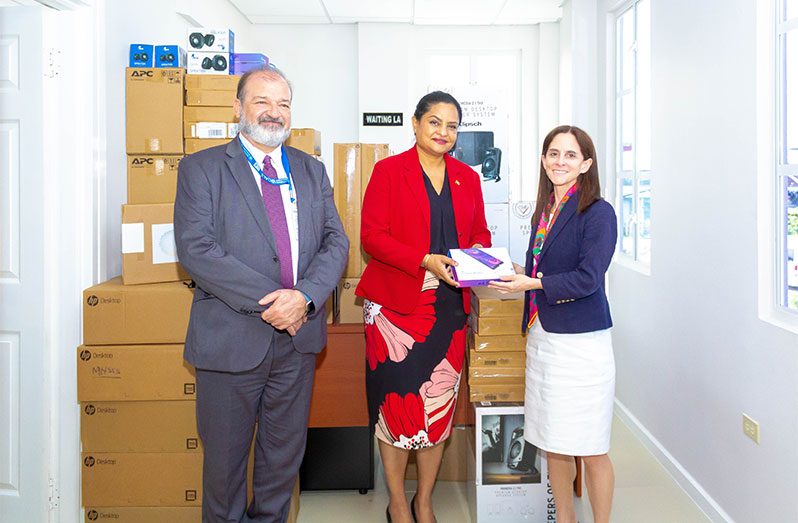–UNDP gifts Human Services Ministry equipment to improve data collection
IN today’s digital age, technology has the potential to play a crucial role in addressing and combatting gender-based violence (GBV). With this in mind, the United Nations Development Programme (UNDP) on Tuesday donated GBV case-management equipment to the Ministry of Human Services and Social Security (MoHS&SS), under the Spotlight Initiative.
And, while last December, Spotlight Initiative signalled the end of three years of powerful work here, the government has promised that efforts would continue under the MoHS&SS.
According to the United Nations Children’s Fund (UNICEF), in Guyana, the Spotlight Initiative aimed to address the root causes of Violence Against Women and Girls (VAWG) with an emphasis on prevention of family violence which includes sexual and gender-based violence, intimate partner violence and school-based violence.
Minister of Human Services and Social Security, Dr. Vindhya Persaud, stated during a handover ceremony at the Hope and Justice Centre at Lusignan, East Coast Demerara (ECD), that gathering data is essential to ending GBV and that the UNDP has been one of Guyana’s most reliable partners in this regard.
A variety of Information Technology (IT) equipment, such as computers, tablets, headsets, speakers and printers, were also given to the centre.
The minister said that these items will increase the centre’s ability to offer services such as counselling, medical intervention, legal aid, psychosocial support, filing a police report, and restorative justice. She stated that the UNDP is helping the ministry, among other things, with creating the software required to digitise records.
She emphasised that the Hope and Justice Centre is a “one stop” where anybody experiencing violence may come and receive a variety of free services under one roof. She noted that the centre is the first of its type in Guyana and the Caribbean which “offers hope”.
Dr. Persaud stated: “So, it’s quite a comprehensive model that I believe will change the landscape of what we know to be the response to gender-based violence,” noting that other Caribbean countries have indicated that they will replicate portions of this model Hope and Justice Centre in their respective countries.
“I believe this will change the landscape of what we know to be the response to gender-based violence. Because we have removed the intimidation, we have removed the frustration of knowing where to go, when to go and whom to go to…So, we [the Caribbean] can in a few years have [a] standardised response… have response that is peculiar to our region and have the kind of robust response that can change those [GBV] numbers.”
She noted that the institution truly provides constant, approachable, and inclusive help to anyone facing violence of any kind.
Dr. Persaud added that in order for future generations to comprehend that violence is never the solution, the dynamics of gender-based violence must shift.
“We must open lines of communication,” she pointed out.
She disclosed that her ministry offers programmes on anger management and conflict resolution and is actively involved in the field of conflict resolution. She made reference to the Hope and Justice Centre when she added, “This will be a refuge, a sanctuary.”
Minister Persaud pointed out that Sustainable Development Goal 5: General equality “hinges on us having a safe and secure world for women and girls.”
In order to strengthen the programmes and policies that the government is putting into place, the UNDP is working with the ministry to develop a GBV database.
According to Gerardo Noto, UNDP’s Resident Representative for Guyana and Suriname, they are currently in the final stages of improving and expanding the capacity to generate, analyse, and produce data on GBV.
He said that the Hope and Justice Centre is a very important part of preventing and supporting survivours.
Meanwhile, Deputy Director of UNDP in Latin America and the Caribbean, Linda Maguire, emphasised that GBV is a problem that many people face on a personal level and made reference to a United Nations (UN) Women Study that revealed 46 per cent of Caribbean women have experienced some sort of abuse.
She reasoned that the Spotlight Initiative is intended to really get at the causes of the GBV.
According to her, data is essential because if you do not know what is happening, and where it is happening, then you will not be able to target effective responses.
According to Maguire, the Hope and Justice Centre is a location where people’s lives will be positively impacted and things are changed for the better.
The government intends to support the hinterland areas by opening a second Hope and Justice Centre in Region One. A third one will be launched in Region Three.
They are expected to be up and running by the first half of this year.



.jpg)








